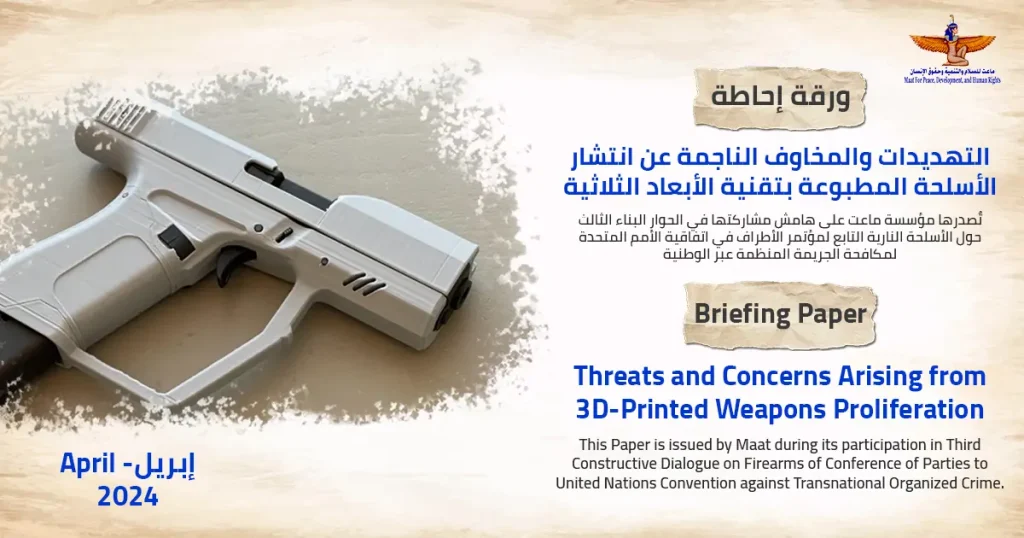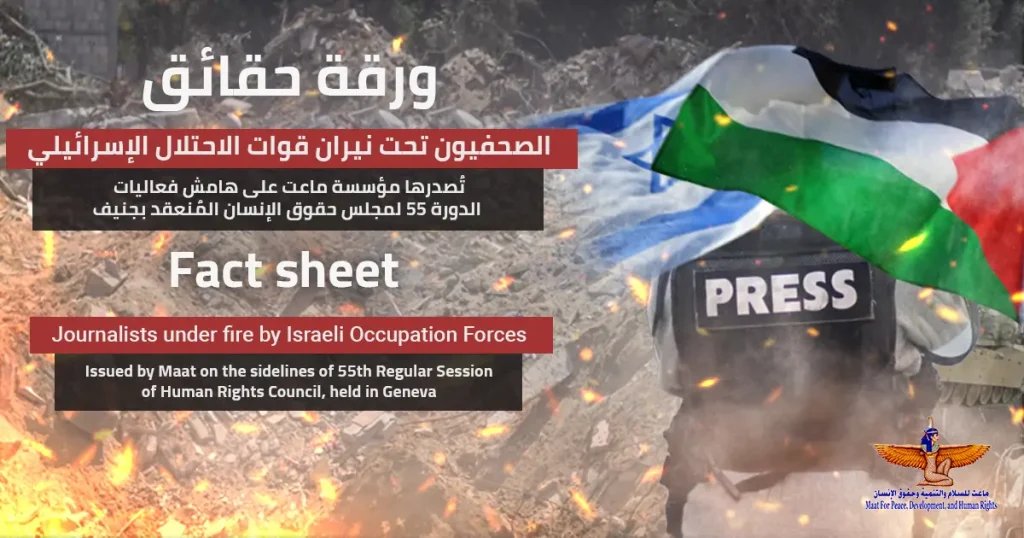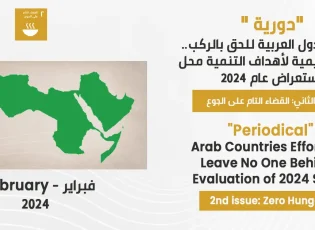Maat: partnership between governments, private sector and civil society is the way for the implementation of Sustainable Development Goals
On the sidelines of the United Nations General Assembly, the President of the United Nations ECOSOC gave a speech on the activity of the High-level Political Forum 2021 (HLPF 2021), entitled “Sustainable and Resilient Recovery from the COVID-19 Pandemic in a Way that Promotes Economic, Social and Environmental Dimensions of Sustainable Development” in the context of building an inclusive and effective path for the achievement of the 2030 Agenda in the context of the decade of action and achievement for sustainable development.”
In his capacity as North Africa Coordinator in the major Non-Governmental Organizations (NGOs), Maat for Peace, Development and Human Rights has participated in the work of the HLPF that was held virtually due to the Covid-19 pandemic from 6 to 15 July, 2021, by submitting oral and written contributions during the voluntary reviews of a number of states. On the sidelines of the HLPF, Maat also held a number of events and issued a number of studies and reports on the reality of achieving Sustainable Development Goals (SDGs).
Concluding Remarks: Compatibility with Maat’s Vision
Concerning the concluding observations of the President of the Economic and Social Council; It came in line with the general vision of the institution, and with the activities and events provided by the Maat Foundation during the current year.
With regard to the concluding remarks of the President of ECOSOC, they were in line with the general vision of Maat Association and its activities and events throughout the current year.
Maat Foundation also agreed with the Forum's vision, whereby the need to integrate sustainable development goals into national development plans, especially with regard to reducing inequality, eliminating poverty and solving the problem of malnutrition, with the aim of reducing risks to current generations, and ensuring a sustainable, prosperous and secure future for future generations.
Accordingly, Maat stresses the findings of the Ministerial meeting held from 13 to 15 July on the negative impacts of the Coronavirus on vulnerable groups. Furthermore, Maat also stresses the idea of accelerating economic recovery that must be in combination with the prioritization of economic goals, particularly Goal 3 of SDGs related to health and sustainable social development.
Moreover, Maat agreed with the Forum’s vision of the need to integrate SDGs into the national development plans, particularly with regard to reducing inequality, eliminating poverty and resolving the problem of malnutrition, in order to minimize the threats to current generations and ensure a sustainable, prosperous and safe future for them. In addressing Goal 6 of the SDGs, Maat emphasized the need for combating illicit financial flows, developing a framework for combating corruption, increasing access to justice, promoting peacebuilding institutions and protecting the rights of vulnerable populations as a necessary requirement for just and flexible societies. In its quarterly report, Maat also addressed the achievement of the SDG 16 in the Arab region and relied on some indicators to monitor such reality in light of the spread of Coronavirus, which are in line with what the Forum has discussed, in particular with regard to the indicators of corruption, crime and peace, while focusing on the most vulnerable groups in conflict countries .[1]
Maat’s activities on the sidelines of the HLPF:
With regard to the events, and under the strategic partnership with the Economic, Social & Cultural Council (ECOSOCC) of the AU, Maat held a virtual session entitled “Sustainable Development in North Africa: The Voluntary Report of Egypt 2021 as A Model” in light of the HLPF to achieve Sustainable Development in July 2021.
In accordance with the Forum’s vision on Goal 1, which calls for putting an end to poverty and Goal 2, which aims to achieve zero hunger, the Forum concluded that the Coronavirus had taken a remarkable toll on the aggravation of poverty, food insecurity and malnutrition rates, which was amplified on the vulnerable groups, including women, children and persons with special needs.
The impact of Covid-19 on human rights in the Arab region had been highlighted by Maat in its annual report that includes a review and monitoring of the reality and challenges of achieving SDGs in the Arab region, topped by the impact of the Coronavirus on the achievement of Goal 1 ( eliminating poverty) and Goal 2 (zero hunger). In this report, Maat addresses the conditions of poverty and hunger in the Arab states, especially those suffering from armed conflicts such as Syria, Yemen and Palestine. The results of this monitoring were in line with the outcomes of the Forum revolving around the doubled impact of the virus on vulnerable groups.
Moreover, Maat attached a particular importance to Goal 6, which aims at ensuring availability and sustainable management of water and sanitation for all, which was overlooked by the Forum, in particular with regard to conflicts over international water resources. In this regard, Maat held a workshop on Goal 6 of SDGs 2030 in February 2021, which focused on the most prominent challenges facing the achievement of such goal at the regional and international levels with wide participation by a number of experts specialized in water affairs from Arab and African states . [2]
The Foundation also participated in the African Initiative "Africa's Waters for Peace: The Nile for Peace" As a path for civil society through which water peace can be achieved, and disputes and disagreements between countries, whether in the Nile Basin region or the water resources of the entire African continent, are rejected.
In the same context, Maat organized another virtual event entitled “Water Disputes and their Impact on Sustainable Development” in July 2021 on the sidelines of the HLPF, being North Africa Coordinator in the major (NGOs). Several experts in the areas of water disputes and water affairs in Africa from different countries participated in such event, which covered discussions and ideas about the ongoing conflict over the Nile River because of the Grand Ethiopian Renaissance Dam (GERD) and the impact of such conflict on the achievement of the SDGs in the Nile Basin region . [3]
As part of its interest in water disputes related to the sixth goal, the Foundation issued, A study under the title of unilateral filling of the Renaissance Dam will cause severe effects on the countries of the Nile BasinIn which it clarifies the potential effects of the Renaissance Dam on the Nile Basin countries, and the expected risks in the event of not reaching a just and binding legal agreement that achieves development for Ethiopia without causing damage to the countries of Egypt and Sudan, in conjunction with Ethiopia's unilateral filling of the Renaissance Dam for the second time without taking into account the rights of the downstream countries. [4]
The Voluntary National Reviews of the SDGs
On the other hand, Maat has endorsed the vision and outcomes of the Voluntary National Reviews (VNRs) under the HLPF umbrella. Maat affirms that the countries that participated in such review have exerted efforts to improve access to justice, through the promotion of national institutions, particularly the legal ones, with the aim to prevent crime and promote human rights. However, much remains to be done for most of the developing countries and those suffering from instability whether because of political differences or because of armed conflicts, particularly countries suffering from terrorism.
As a representative of the major NGOs, Maat made an oral intervention during the presentation of Egypt’s voluntary report by the Egyptian government delegation, led by Prof. Dr. Hala Helmy El-Said, the Minister of Planning and Economic Development. Maat presented an oral intervention on the major challenges facing the government towards achieving comprehensive sustainable development, topped by the out-of-date data in government sectors in a manner that does not serve development, despite the efforts made. Maat is still awaiting for more climate action to improve the per capita indicator of CO2 emissions. Moreover, investment in human capital is a long and complex process that requires more attention under “Egypt Vision 2030” and starts from basic education level to retirement age. Maat also recommended paying more attention to knowledge economy, promoting innovation, exerting more efforts with regard to medium and small enterprises and providing more non-traditional finance for investment in human capital.
Maat was also interested in issuing shadow reports on the sidelines of the participation of some states in the national reviews, as it issued a shadow report parallel to Qatar’s voluntary report, entitled “The Path of Sustainable Development in Qatar... Failures Highlighted by the COVID-19 Pandemic”. This report focuses on the primary axes in the 2030 development agenda, namely: the economic axis that focuses on Goals 1, 2, 3 and 8 of SDGs as the most prominent goals related to achieving economic goals, the social axis that focuses on Goals 4 and 5 and the security axis that focuses on Goal 16 .[5]
Recommendations after the presentation of the concluding remarks on the HLPF:
Within the framework of what Mukhles, the President of the Economic and Social Council, stated regarding the main themes on which the high-level political forum focused, the Maat Foundation for Peace, Development and Human Rights recommends a set of recommendations that revolve around the following:
First: In view of the multiplier negative impacts of the Coronavirus on women, older persons, youth, children, migrants, refugees, persons with special needs, indigenous peoples and other vulnerable groups, it is urgent to address inequality and to achieve social justice through the establishment of a universal body for the social protection of vulnerable groups affected by the pandemic
Second: Given the important role of women and youth in building peace in societies, the different groups and peoples must cooperate with the civil society and participate in raising awareness on the meaning of peace and justice and their role in achieving SDGs.
Third: In view of the suffering of conflict countries from the spread of terrorist operations to a greater extent than others, Maat calls upon the governments of states and armed forces to work on developing strategic plans in order to curb the hotbeds of terrorist groups and to control their areas of concentration. Maat also recommends the non-extremist and centrist religious institutions to raise awareness among the peoples on terrorism in the name of religion, particularly among young people who are most likely to be influenced by these extremist terrorist groups speaking in the name of religion.
Fourth: In light of the widespread conflicts around the world that hinder the achievement of SDGs, Maat calls upon the ECOSOC to pay more attention to the states suffering from the consequences of such conflicts, which directly affect the provision of water and sanitation to all and the sustainable management of water resources.
Notably, the HLPF is a topic of interest to Maat, being North Africa Coordinator in the major Non-Governmental Organizations (NGOs) in Africa of the United Nations Department of Economic and Social Affairs (UN DESA). Moreover, Maat is a member of the General Assembly for the Economic, Social & Cultural Council (ECOSOCC) of the Africa Union (AU) and serves as an Observer in the African Commission on Human and People's Rights (ACHPR).
[1] (You can view the report of the Maat Al Arabi Foundation under the title “The State of Human Rights in the Arab World in the Light of the Corona Pandemic”, and follow-up to the sustainable development axis within it, through the following link: https://maatpeace.org/ar/?p=32395 [2] To view the Maat Foundation statement about the workshop, visit the following link: https://bit.ly/3lu6FlK [3] Details of the event on water disputes can be found at the following link: https://maatpeace.org/ar/?p=33325 [4] To view the full study, visit the following link: https://bit.ly/3hwvL2s [5] To view the report, visit the following link: https://maatpeace.org/ar/?p=33426












